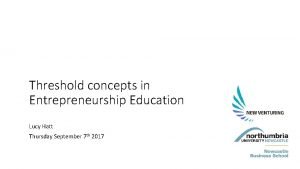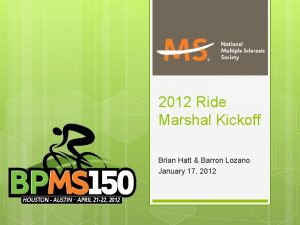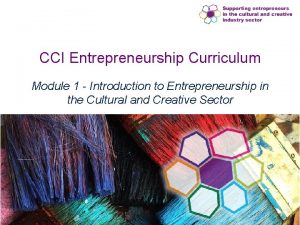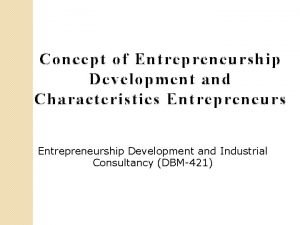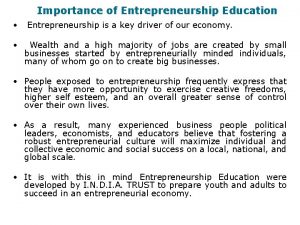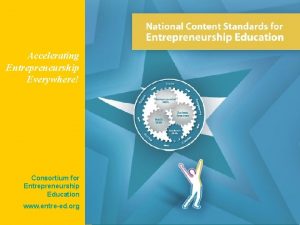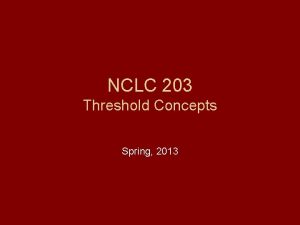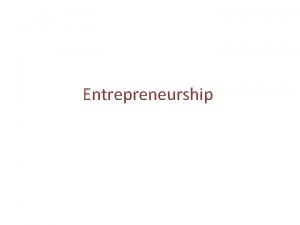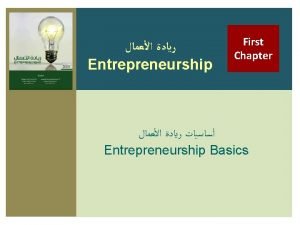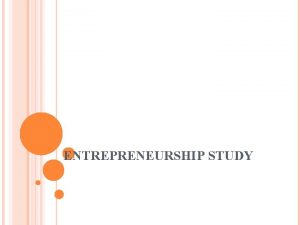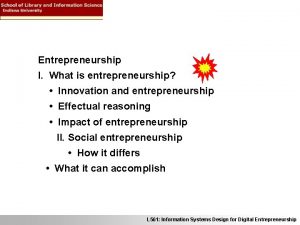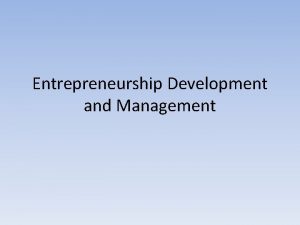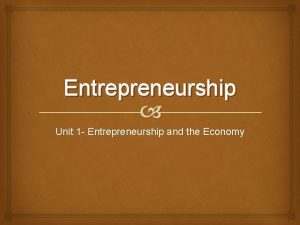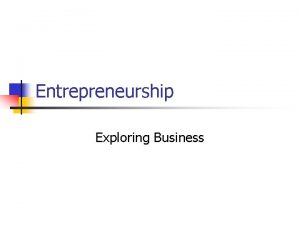Threshold concepts in Entrepreneurship Education Lucy Hatt Thursday












- Slides: 12

Threshold concepts in Entrepreneurship Education Lucy Hatt Thursday September 7 th 2017

Research Context and Rationale • Enterprise and entrepreneurship are seen as positive drivers of social, economic and political change • Ongoing debate around the distinctive nature of entrepreneurship and how best to teach it • Defining entrepreneurship threshold concepts is likely to inform the development of entrepreneurship curricula • Transactional curriculum inquiry (TCI) involving entrepreneurs, entrepreneurship educators, students and educational experts ensures external and internal stakeholder involvement • Findings will be of interest to scholars in education and entrepreneurship

Research Aim and Objectives The aim of this research is to make an original contribution to the enhancement of entrepreneurship education Research Objectives • To identify what it is that a student needs to grasp and/or become in order to “think like an entrepreneur” from multiple perspectives including expert entrepreneurs, educators and students • To explore how the prerequisite transformations maybe engendered in students through the curriculum and pedagogy Preparing students not just necessarily to be business founders but also to be more creative, to be innovators and agents of change in the organisations they work for

Research Questions • What does it mean to “think like an entrepreneur? ” • What are threshold concepts that need to be understood in order to “think like an entrepreneur”? • What pedagogical considerations and aspects of curricula design facilitate and hinder learning in entrepreneurship?

Threshold Concepts • Transformative • Irreversible • Integrative • Often troublesome • Bounded Smith, Young, Raeside & Elliot (2015)

Summary of work and conclusions to date 17 Individual interviews with expert entrepreneurs 9 Candidate Threshold Concepts (CTC) 12 expert ratings of importance of each CTC to thinking as an entrepreneur Collated ratings shared with expert panel. 10 expert responses to criticality of each to thinking as an entrepreneur 5 Candidate Threshold Concepts (CTC) agreed by 9 or 10 (of 10) respondents

Entrepreneurship Threshold Concepts “I can create value” Self-Efficacy “I see opportunities” Opportunity “I understand the risks” Risk “I know what’s important” Focus “I take action” Impact Self-efficacy is about thinking “I can do this” whilst being (*highly) self-aware, selfcontrolled and conscious of one’s own strengths and weaknesses. It is about accepting mistakes as part of learning, and always being interested in knowing more. *later removed Opportunity is about seeing commercial potential where others do not. It is associated with intuition, making patterns and connections. It implies future orientation and a focus on possibilities for improvement. Risk is regarded as a sign of a potential opportunity, something to be understood - even sought out - rather than necessarily avoided. It implies quick wits, requires discernment and is not reckless. Focus is about making choices, having a clear vision and passionately driving towards it. It implies effective prioritisation, appropriate delegation and never switching off. Focus means intense, single-minded determination. Impact is about making things happen and taking action (*on a grand scale) combined with a sense of urgency and a desire to make a difference. It requires courage and implies a degree of compulsion. *later removed

4 others that didn’t make the cut with the entrepreneurs… “I can be different” (Deviance) “Work = Play = Life” (Work) “I need other people” (Team) Deviance is about being unconsciously unconventional, able to resist the pressure to conform or do what family and society expects. It implies a degree of strong mindedness and can sometimes be perceived as being difficult or arrogant. Work is not a distinct bounded set of activities, but integral to and indistinguishable from living and playing. It implies incredible effort invested by choice which is intrinsically motivated. An effective team is prerequisite to success. Team is about knowing that the team can do more than the collection of individuals combined, not feeling threatened by the capabilities of others, but seeking out others abler than you. “I know the fundamentals of Having fundamental business knowledge in sales & marketing, finance and human resources. business” (Business Fundamentals)

Informed Consent Diamond Ranking Exercise with educators to identify the most significant and transformational concepts in teaching entrepreneurship. (Part of a multi-stage transactional curriculum inquiry to develop entrepreneurship curricula. ) You are invited to take part in a research study to identify the most significant and transformational concepts in teaching entrepreneurship. The study is conducted by Lucy Hatt as part of her doctoral studies at Durham University. * This research project is supervised by Professor Ray Land (ray. land@durham. ac. uk) and Dr Nicola Reimann (nicola. reimann@durham. ac. uk) from the School of Education at Durham University. The purpose of this study is identify the most significant and transformational concepts in teaching entrepreneurship. If you agree to be in this study, you will be asked to participate in a Diamond Ranking exercise in a small group. Your participation in this study will take approximately 30 minutes. You are free to decide whether or not to participate. If you decide to participate, you are free to withdraw at any time without any negative consequences for you. All responses you give or other data collected will be kept confidential. The records of this study will be kept secure and private. All files containing any information you give are password protected. In any research report that may be published, no information will be included that will make it possible to identify you individually. There will be no way to connect your name to your responses at any time during or after the study. If you have any questions, requests or concerns regarding this research, please contact me via email at lucy. e. hatt@durham. ac. uk or by telephone at 0773 421 8412.

Group Discussion Part 1 • Diamond Ranking Exercise • Discuss the concepts presented – are all Threshold Concepts? • • • Transformative Integrative Bounded Irreversible Often troublesome • Are any missing? • Place your 9 Threshold Concepts on the Diamond in order of importance… Part 2 • Share a summary of an example of an effective entrepreneurship/ enterprise workshop/classroom exercise • Which TC’s does your exercise address? How do you know? How do you assess? • What changes, if any, will you make to your exercise as a result of considering it through the lens of TC theory?

Wrap Up

References • Barradell, S. (2013). The identification of threshold concepts; a review of theoretical complexities and methodological challenges. Higher Education, 65, 265 -276. doi: 10. 1007/s 10734 -012 -9542 -3 • Béchard, J. -P. , & Grégoire, D. (2007). Archetypes of pedagogical innovation for entrepreneurship in higher education: Model and illustrations. Handbook of Research in Entrepreneurship Education: A General Perspective, 1, 261 -284. • Cousin, G. (2009). Researching learning in higher education: An introduction to contemporary methods and approaches. Routledge. • Gibb, Allan A. "Enterprise culture and education understanding enterprise education and its links with small business, entrepreneurship and wider educational goals. " International small business journal 11, no. 3 (1993): 11 -34. • Hannon, P. D. (2005). Philosophies of enterprise and entrepreneurship education and challenges for higher education in the UK. The International Journal of Entrepreneurship and Innovation, 6(2), 105 -114. • Knight, F. H. (1921). Risk, uncertainty and profit. New York: Hart, Schaffner and Marx. • Lackéus, M. (2015). Value Creation as Educational Philosophy. (Doctor of Engineering), Chalmers University of Technology, Gothenburg, Sweden. • Linstone, H. A. , & Turoff, M. (1975). The Delphi method: Techniques and applications (Vol. 29): Addison-Wesley Reading, MA. • Matlay, H. , Penaluna, A. , & Penaluna, K. (2009). Assessing creativity: drawing from the experience of the UK's creative design educators. Education+ Training, 51(8/9), 718 -732. • Meyer, J. , & Land, R. (2003). Threshold concepts and troublesome knowledge (1) linkages to ways of thinking and practising within the disciplines. Improving student learning theory and practice - 10 years on. (pp. 412 -424). Oxford: OCSLD. • Meyer, J. , & Land, R. (2005). Threshold concepts and troublesome knowledge (2): Epistemological considerations and a conceptual framework for teaching and learning. Higher Education, 49(3), 373 -388. doi: 10. 1007/s 10734 -004 -6779 -5 • Pinchot III, G. (1987). Innovation through intrapreneuring. Research management, 30(2), 14 -19. • Pittaway, L. , & Cope, J. (2007). Entrepreneurship education: a systematic review of the evidence. International Small Business Journal, 25(5), 479 -510. • Rescher, N. (1998). Predicting the future: An introduction to theory of forecasting: SUNY press. • Sarasvathy, S. D. (2008). Effectuation. Elements of Entrepreneurial Expertise. Cheltenham: Edward Elgar Publishing Limited. • Schumpeter, J. A. (1934). The theory of economic development: An inquiry into profits, capital, credit, interest, and the business cycle (Vol. 55). Transaction publishers. • Shane, S. A. (2000). A general theory of entrepreneurship: The individual-opportunity nexus: Edward Elgar Publishing.
 Lucy hatt
Lucy hatt Ride marshal responsibilities
Ride marshal responsibilities Threshold definition ap human geography
Threshold definition ap human geography Threshold concepts in writing
Threshold concepts in writing Entrepreneurship module 1 introduction to entrepreneurship
Entrepreneurship module 1 introduction to entrepreneurship Characteristics of an entrepreneur
Characteristics of an entrepreneur Importance of entrepreneurship education
Importance of entrepreneurship education Consortium for entrepreneurship education
Consortium for entrepreneurship education Thoughtful thursday morning message
Thoughtful thursday morning message Monday tuesday wednesday thursday friday calendar
Monday tuesday wednesday thursday friday calendar St paul's church wibsey
St paul's church wibsey Holy thursday poem analysis
Holy thursday poem analysis Blessed holy thursday
Blessed holy thursday
